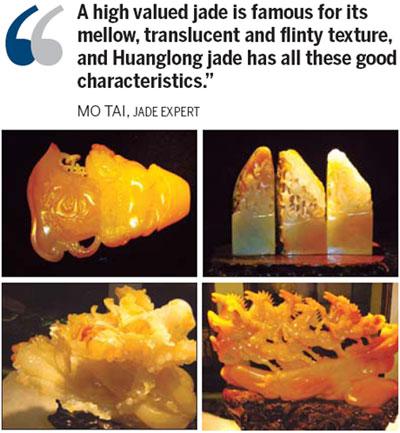
Huanglong jade's prices have jumped rapidly in the past five years as its popularity with collectors grew. [Provided to China Daily]
KUNMING - In the Qingfeng Jewelry Shop located in Longling, Yunnan province, there is a superb collection of carvings and raw gemstones made of Huanglong jade. Some of the carvings are valued at more than 10 million yuan ($1.47 million) each.
"I have a carving showing an old man fishing alone on a boat in the snow, which is a perfect combination of the Huanglong jade material, creative design and carving craft. Someone offered 8 million yuan for it, but I didn't accept it," said Chang Guoqing, president of Qingfeng Jewelry Ltd Co.
Chang, who used to be a driver at Baoshan Passenger Terminal, is now worth more than 100 million yuan. After failing at running a restaurant and a car washing station, Chang started to invest in Huanglong jade. He hasn't looked back since.
Chang's success story began in 2004 when he was 25 years old. Two businessmen from Guangxi found an attractive yellow-colored stone near Longling. They were interested in collecting more samples and Chang agreed to help them. He paid a local farmer 300 yuan for one piece of the stone, and sold it for 500 yuan. What he had stumbled upon was a valuable repository of Huanglong jade.
He later discovered he could turn 1,000 yuan into 2,000 yuan buying and selling the microcrystalline silicates and saw a huge business opportunity. He opened his first exclusive Qingfeng Jewelry Shop to sell the Huanglong jade in Baita Shuixiang Market, a specialist trading venue, in Longling in March 2006.
"At that time, I had accumulated 200,000 yuan from the 300 yuan investment in my first piece of Huanglong jade," said Chang.
Huanglong jade, first discovered in Supa River in 2004, is a high-quality mineral enjoying equal popularity with Hetian jade and emeralds in China. The principal color of the stone is yellow with red, bluish white, black and other traces.
In Chinese traditional culture, yellow represents dignity and elegance and was the official color of the imperial family, said Mo Tai, a jade expert.
"A high valued jade is famous for its mellow, translucent and flinty texture, and Huanglong jade has all these good characteristics," said Mo. Huanglong jade attracts people with its soft luster, and there is a plenty of scope for it to appreciate in value, he added.
Huanglong jade ore has recently been selling at more than 10,000 yuan per kilogram. Bangles made from it cost about 1,000 yuan each. In Chang's opinion, the market price of Huanglong jade is only 10 percent of its value. That means, for instance, a 100,000 yuan sample of Huanglong jade today could be sold at 1 million yuan in the future.
Yang Huren, a farmer from Longling, told China Daily that the annual income of his family of six people was only 5,000 yuan when they relied on farming for an income. He started to sell Huanglong jade ore in 2006 and, thanks to the fast rising price, Yang earned more than 60,000 yuan last year, enabling him to buy a van.
Many farmers in Longling have become rich by trading Huanglong jade. Their living conditions as well as the local infrastructure have improved considerably. Most of the farmers have bought motorcycles or vans. They moved to brick-made buildings from adobe houses and they could afford televisions, washing machines and fridges.
The local government has been exploiting the resource since 2004. An industry involving Huanglong jade mining, processing and trading has grown rapidly in Longling. Research shows there are more than 600 private companies involved in the business, with 40,000 to 60,000 employees. Between 20,000 and 30,000 of them are outsiders mainly from Fujian, Henan, Shanghai and Guangdong.
According to local policy, if a company's total sales of Huanglong jade are more than 100 million yuan after public auction, the company should give 24 percent of its income to local farmers, and use 6 percent to maintain the mines. Meanwhile, the locals can annually get 800 yuan per mu (0.067 hectare) of their contracted mining area from the local government.
Investors in Huanglong jade were mainly from Guangdong and Guangxi previously. However, coal mine owners from Shanxi have begun to invest in it since the beginning of this year, injecting 50 to 60 million yuan into the industry. And after the readjustment of the nation's real estate policy, investors from Zhejiang and Liaoning moved their capital from the property market into Huanglong jade.
Huanglong jade mines are mainly located in Xiaoheishan and the Supa River area in Longling. Its reserves are put at 420,000 tons. The distribution area of high-quality Huanglong jade ore in Xiaoheishan is about 2 square kilometers while the whole mine area is almost 40 square kilometers, according to Hou Desheng, the chief executive of the Huanglong Jade Industry Association.





